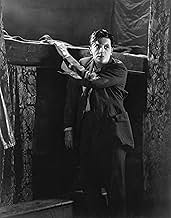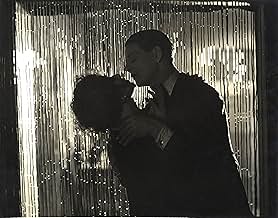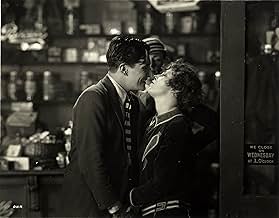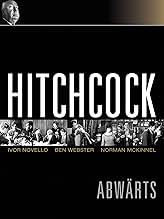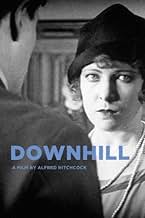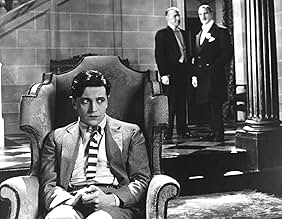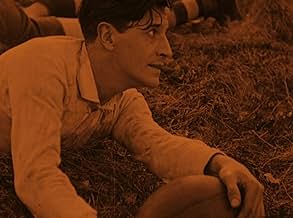IMDb RATING
6.0/10
3.3K
YOUR RATING
Bound by honor, a successful schoolboy takes the blame for his roommate's indiscretion, and it's all downhill from there.Bound by honor, a successful schoolboy takes the blame for his roommate's indiscretion, and it's all downhill from there.Bound by honor, a successful schoolboy takes the blame for his roommate's indiscretion, and it's all downhill from there.
Constance Collier
- Dance Hall Lady with Purse
- (uncredited)
Daisy Jackson
- The Seductive Waitress
- (uncredited)
Featured reviews
Silent film directed by Alfred Hitchcock about a wealthy young man named Roddy (Ivor Novello) who takes the blame for a friend's indiscretions with a tramp and finds his whole life unraveling because of it. Not entirely successful, with a yawner of an ending, but worth a look for Novello's performance and glimpses of Hitchcock's emerging style. Tenth-billed Ian Hunter plays a small role as an actor who helps rip Roddy off. The whole thing is filmed in sepia tone except for a section in green, the reason behind which is actually fairly clever. Watch and I'm sure you'll figure it out. It's a decent picture but it goes on too long. Lost my interest well before the disappointing ending. Still, give it a go and form your own opinion. Even a lesser Hitchcock film is worth seeing.
The story, of course, is not acceptable now. It's based on a play written by two performers who were major stage figures in their time but are now principally remembered for a few film roles (Novello in Hitchcock's THE LODGER, Collier as the has-been actress teaching acting to young girls in LaCava's STAGE DOOR). The story tells of the long, melodramatic, total downfall and degeneration of a son of wealth with a seemingly bright future, the hero of the rugby field, who is disgraced when he takes the rap for his impoverished roommate at his British school. Modern audiences tend to find this sort of melodrama, no matter how well done, a bit ridiculous. The anguished query of young Novello when he's told that he's expelled, "Does this mean, sir, that I won't be able to play rugby for the Old Boys?" is justly famous for its fatuousness. But the film itself is not fatuous, or ridiculous in the slightest. It shows Hitchcock to be one of the greatest of all the masters of the silent cinema, using an array of sophisticated film techniques to build a narrative complexity that goes far beyond the melodramatic plot. The pictorial quality of the film is lush and dense and the photography is sophisticated.
For one thing, he uses very few titles. Of course, he was not alone in trying to keep silent-film intertitles to a minimum. But directors like Murnau tended to tell simple "timeless" stories with very formal pictography, the story told through a series of strong, simple, iconic images, the characters hardly speaking. Hitchcock has preserved verisimilitude by having his characters talk as much as they want. If what they're saying isn't important, such as the small talk among the rugby spectators at the beginning, why show it in titles? The casual milieu is established more clearly, in fact, if one doesn't know exactly what's being said. Hitchcock's use of this technique is even more evident in THE FARMER'S WIFE (also adapted from a play), where the characters talk and talk, but rarely is there a title. We talk constantly in real life, and one of the things that makes some silents seem stilted is the refusal to have the characters say anything unless what they say is shown in a title.
Even when characters reveal their inner feelings to each other, the words they speak are often not the best communicators. Hitchcock shows relationships through subtle facial expressions, body posture, and observant human movements, through editing, little close-ups or vignettes of action, and placement of camera. All sorts of naturalistic bits of business are used to make the story clear and dramatically interesting. These techniques convey subtle relationships even more strongly when titles are not there to "explain" the content in words to the viewer, undercutting the images.
Amid symbolic images of his "descent," such as traveling down London's endless escalators to the underground trains, and riding down in an elevator, the story of Novello's decline is laid out in melodramatic detail. A few incidents, and Hitchcock's handling of them, are described below.
The film opens on the day of a big rugby game, and the visiting families dine with the students in the school's great dining hall. At one point, the sister of Novello's poor roommate steps into a stairwell and sees two small boys fighting on the stair. Then a door opens, and she glimpses Novello toweling up after a shower. Nothing comes of either of these incidents (she doesn't see Novello again); they are just original, well staged, atmospheric moments. Having attended a British boarding school for a year in the fifties, I can attest that these are particularly telling touches. Long, aimless, vicious fights were a hallmark of that existence, and I also remember incidents of women embarrassed at being out of place in a boys' school.
The roommate gets a note from the attractive waitress to meet him at the sweet shop where she works. At the same time, she flirts with Novello. The two young men visit the girl at the sweet shop, and there's a long scene where each of them dance with her in a back room. She obviously favors Novello, and Hitchcock cuts from shots of Novello dancing with the shop-girl to the gradually disapproving stare of his companion. However, as the other fellow goes out, she points to the sign "Closed Wednesday Afternoons," a typical example of visual storytelling which not only economically indicates (without titles) that she has asked him to return, but also the furtive nature of the invitation. Later, she comes to the school and accuses Novello of making her pregnant (not of theft, as the IMDB synopsis and other sources state). She accuses him, apparently, because she was mad at him for ignoring her, and because he's rich and can presumably pay off. The actress playing the shop girl (Daisy Jackson, per a photo caption in the Citadel Hitchcock book, though she isn't in any credits listing, including in that book and IMDB) is very attractive and an excellent silent film actress.
After Novello is cast out of his father's house, the scene changes, with a title, "Make Believe." We see Novello in a tuxedo, talking. The camera pulls back and we find him a waiter. After some action, the scene is revealed to be part of a musical; he's a stage actor now. "Make believe" for sure; first we think he's in high society, then a waiter, finally an actor!
After falling further, we find him in France, a male taxi-dancer under the thumb of an iron-handed battle-ax. He spends an evening at the table of an older woman (Violet Farebrother) who sympathetically listens to his life story. But at the end of the evening, so late that it's now morning, a man has an attack and the windows are opened to let in fresh air. The glaring sunlight floods into the foul night-spot, and Novello looks around at the dissipated, apathetic revellers, looks at the now-much-faded "interesting" older woman, and realizes the horror of his surroundings. The scene exudes a profound sense of revulsion and loathing, a depth of feeling on a plane rarely found in Hitchcock.
Finally, Novello is fever-stricken and delirious in a dockside dive, cared for by scruffy blacks. As they pile him on to a small steamer, his shaky passage to the ship, on the gang-plank and into the cabin is presented in striking hand-held point-of-view shots.
The sophisticated narrative style, the profusion of telling details, the richness of the visuals, all made the film gripping and dramatic, despite the hoary plot and a slight over-length. Before Hitchcock found his "niche," he used his talents to make quite a few unexpectedly eclectic films that showed a remarkable talent, constantly inventive and original, continually using film in creative ways. His silent films are largely ignored because they, for the most part, do not conform to the Hitchcock subject matter. But he's one of the great silent directors! He understood the medium and used it more subtly and creatively than many more famous practitioners.
For one thing, he uses very few titles. Of course, he was not alone in trying to keep silent-film intertitles to a minimum. But directors like Murnau tended to tell simple "timeless" stories with very formal pictography, the story told through a series of strong, simple, iconic images, the characters hardly speaking. Hitchcock has preserved verisimilitude by having his characters talk as much as they want. If what they're saying isn't important, such as the small talk among the rugby spectators at the beginning, why show it in titles? The casual milieu is established more clearly, in fact, if one doesn't know exactly what's being said. Hitchcock's use of this technique is even more evident in THE FARMER'S WIFE (also adapted from a play), where the characters talk and talk, but rarely is there a title. We talk constantly in real life, and one of the things that makes some silents seem stilted is the refusal to have the characters say anything unless what they say is shown in a title.
Even when characters reveal their inner feelings to each other, the words they speak are often not the best communicators. Hitchcock shows relationships through subtle facial expressions, body posture, and observant human movements, through editing, little close-ups or vignettes of action, and placement of camera. All sorts of naturalistic bits of business are used to make the story clear and dramatically interesting. These techniques convey subtle relationships even more strongly when titles are not there to "explain" the content in words to the viewer, undercutting the images.
Amid symbolic images of his "descent," such as traveling down London's endless escalators to the underground trains, and riding down in an elevator, the story of Novello's decline is laid out in melodramatic detail. A few incidents, and Hitchcock's handling of them, are described below.
The film opens on the day of a big rugby game, and the visiting families dine with the students in the school's great dining hall. At one point, the sister of Novello's poor roommate steps into a stairwell and sees two small boys fighting on the stair. Then a door opens, and she glimpses Novello toweling up after a shower. Nothing comes of either of these incidents (she doesn't see Novello again); they are just original, well staged, atmospheric moments. Having attended a British boarding school for a year in the fifties, I can attest that these are particularly telling touches. Long, aimless, vicious fights were a hallmark of that existence, and I also remember incidents of women embarrassed at being out of place in a boys' school.
The roommate gets a note from the attractive waitress to meet him at the sweet shop where she works. At the same time, she flirts with Novello. The two young men visit the girl at the sweet shop, and there's a long scene where each of them dance with her in a back room. She obviously favors Novello, and Hitchcock cuts from shots of Novello dancing with the shop-girl to the gradually disapproving stare of his companion. However, as the other fellow goes out, she points to the sign "Closed Wednesday Afternoons," a typical example of visual storytelling which not only economically indicates (without titles) that she has asked him to return, but also the furtive nature of the invitation. Later, she comes to the school and accuses Novello of making her pregnant (not of theft, as the IMDB synopsis and other sources state). She accuses him, apparently, because she was mad at him for ignoring her, and because he's rich and can presumably pay off. The actress playing the shop girl (Daisy Jackson, per a photo caption in the Citadel Hitchcock book, though she isn't in any credits listing, including in that book and IMDB) is very attractive and an excellent silent film actress.
After Novello is cast out of his father's house, the scene changes, with a title, "Make Believe." We see Novello in a tuxedo, talking. The camera pulls back and we find him a waiter. After some action, the scene is revealed to be part of a musical; he's a stage actor now. "Make believe" for sure; first we think he's in high society, then a waiter, finally an actor!
After falling further, we find him in France, a male taxi-dancer under the thumb of an iron-handed battle-ax. He spends an evening at the table of an older woman (Violet Farebrother) who sympathetically listens to his life story. But at the end of the evening, so late that it's now morning, a man has an attack and the windows are opened to let in fresh air. The glaring sunlight floods into the foul night-spot, and Novello looks around at the dissipated, apathetic revellers, looks at the now-much-faded "interesting" older woman, and realizes the horror of his surroundings. The scene exudes a profound sense of revulsion and loathing, a depth of feeling on a plane rarely found in Hitchcock.
Finally, Novello is fever-stricken and delirious in a dockside dive, cared for by scruffy blacks. As they pile him on to a small steamer, his shaky passage to the ship, on the gang-plank and into the cabin is presented in striking hand-held point-of-view shots.
The sophisticated narrative style, the profusion of telling details, the richness of the visuals, all made the film gripping and dramatic, despite the hoary plot and a slight over-length. Before Hitchcock found his "niche," he used his talents to make quite a few unexpectedly eclectic films that showed a remarkable talent, constantly inventive and original, continually using film in creative ways. His silent films are largely ignored because they, for the most part, do not conform to the Hitchcock subject matter. But he's one of the great silent directors! He understood the medium and used it more subtly and creatively than many more famous practitioners.
Classmates and close friends at an English public school, Roddy Berwick and Tim Wakely compete for the affections of a local shop girl. When the girl falsely accuses Roddy of getting her pregnant, he is expelled. However, Roddy remains silent to protect Tim, who was the guilty party, and the friends make a pact to keep silent. Outraged at his expulsion, Roddy's father does not believe his son's claims of innocence and throws him out. Thus, Roddy strikes out on his own, and his life begins a downward spiral from stage acting to a disastrous marriage to taxi dancing to the Marseilles waterfront. "When Boys Leave," also known as "Downhill," was Alfred Hitchcock's fifth completed film, and, early on in his career, the master director explores his oft-repeated theme of the wrongfully accused.
Shot in 1927, the film is silent with inter-titles, and the black-and-white cinematography is often well lit with striking visual compositions. However, Hitchcock generally holds the camera steady, and movement occurs within the frame. The film lacks the camera fluidity common among movies of the late silent era, although Hitchcock is already a master of visual story-telling, and the inter-titles are brief and sparse. As Roddy's life reels out of control, he is dwarfed by his surroundings in rooms with impossibly high ceilings and doors that are more than twice his height. Fortunately, Hitchcock elicits naturalistic performances from his cast, and none indulges in the grand style of acting that negatively stereotyped silent movies. Ivor Novello, a Welsh matinée idol best known for his musical talents, plays the suffering Roddy quite well. Isabel Jeans as Julia Fotheringale, a spendthrift actress, and Ian Hunter as Archie, Julia's shady lover, provide amusing support during one colorful episode in Roddy's descent.
"When Boys Leave" is from Hitchcock's apprentice period in England, when he was still learning the craft. While the story is thin, and the motivations vague, this short silent film shows flashes of the genius to come, and, for students of the master, every Hitchcock film is worthwhile viewing.
Shot in 1927, the film is silent with inter-titles, and the black-and-white cinematography is often well lit with striking visual compositions. However, Hitchcock generally holds the camera steady, and movement occurs within the frame. The film lacks the camera fluidity common among movies of the late silent era, although Hitchcock is already a master of visual story-telling, and the inter-titles are brief and sparse. As Roddy's life reels out of control, he is dwarfed by his surroundings in rooms with impossibly high ceilings and doors that are more than twice his height. Fortunately, Hitchcock elicits naturalistic performances from his cast, and none indulges in the grand style of acting that negatively stereotyped silent movies. Ivor Novello, a Welsh matinée idol best known for his musical talents, plays the suffering Roddy quite well. Isabel Jeans as Julia Fotheringale, a spendthrift actress, and Ian Hunter as Archie, Julia's shady lover, provide amusing support during one colorful episode in Roddy's descent.
"When Boys Leave" is from Hitchcock's apprentice period in England, when he was still learning the craft. While the story is thin, and the motivations vague, this short silent film shows flashes of the genius to come, and, for students of the master, every Hitchcock film is worthwhile viewing.
A slapdash early effort by young director Alfred Hitchcock, "Downhill" a. k. a. "When Boys Leave Home," delivers moments of brilliance undone by an underbaked plot.
Young Roddy (Ivor Novello) is expelled from his boarding school when he is charged with a major infraction involving a woman at a local bake shop. No use appealing to his father, who stares at him with frightening disgust. Roddy makes his way alone in life, coming up against a pair of theatrical con artists before landing in a seedy music hall, providing dances for lonely women at 50 francs a whirl. It all gets to be too much for the frail boy.
Poor Roddy can't catch a break, even in cyberspace. A lot of reviewers, both here at IMDb.com and elsewhere, have at the fellow for one deathless line he delivers when his headmaster drops the hammer: "Can I - Won't I be able to play for the Old Boys, sir?" It's a line dripping with ingenuousness, but actually works better in context. Roddy is a true believer in the code of his school who runs up against a world that doesn't allow for second chances.
Based on an adaptation of a play Novello co-authored with Constance Collier under the pseudonym "David L'Estrange," "Downhill" pushes the action from one setpiece to another with little explanation or character development. Hitchcock seems far more enthusiastic about his set pieces and camera tricks than giving the viewer anything to hold onto. Even dialogue cards are kept at a minimum in this very non-verbal silent film.
The best sequence, a section called "The World Of Make-Believe," plunges Roddy into the harsh world of show biz, where conniving actress Julia (Isabel Jeans) and her significant other Archie (Ian Hunter) set up a suddenly cash-rich Roddy.
Watching Archie as Roddy pledges his love to Julia, smoking and drinking and looking frightfully bored as he awaits the chance to offer his casual blessing to their ersatz union, features terrific acting from all concerned. Hitchcock does well in this section by playing up the humor of the situation. But when it's over, there's no explanation or attempt at grounding things. What's this kid going to do about his new marriage? We just follow Roddy to his next stop on his downhill journey.
Hitchcock presents us with some arresting images. One favorite of mine shows a daytime view of Roddy's boarding school dissolving into a scene of London at night. Anyone curious at how England looked in the 1920s will enjoy these views for their travelogue value, anyway.
Novello is worthy, too, carrying the film as he must. He's too old for the part, but believably earnest even as he goes from bright student to all-around chump. A better film would give us more of a basis for this, but all we get is some eye fluttering from Novello to tell us of his deer-in-the-headlights state. It worked for Novello's female fan base at the time, but not for us.
Hitchcock too often works in this surface manner. He shrugs off any subtlety in pursuit of the big effect. The worst of these feature Roddy's father, Sir Thomas (Norman McKinnel), who bears a striking resemblance to Nosferatu and shows up late in the film in Roddy's wracked point-of-view in a slew of implausible guises.
Still, I was interested enough in Roddy's journey, if only as a matter of historical interest. Early on, we see he is the genuine article, a real believer in the world he inhabits, holding a cap emblazoned with the word "Honour." There's a scene, arrestingly similar to the deconstructive Lindsay Anderson film "if ", where Roddy and his friend meet that girl in the bake shop. No playing tiger in this one, Roddy just dances with the girl a little and tries to make a polite exit, but the damage is just as much as if he broke out the tommy guns like Mick and company in that later, anarchic classic.
"Downhill" is a coming-of-age movie that only really works as a look at Hitchcock's own coming of age – before he arrived.
Young Roddy (Ivor Novello) is expelled from his boarding school when he is charged with a major infraction involving a woman at a local bake shop. No use appealing to his father, who stares at him with frightening disgust. Roddy makes his way alone in life, coming up against a pair of theatrical con artists before landing in a seedy music hall, providing dances for lonely women at 50 francs a whirl. It all gets to be too much for the frail boy.
Poor Roddy can't catch a break, even in cyberspace. A lot of reviewers, both here at IMDb.com and elsewhere, have at the fellow for one deathless line he delivers when his headmaster drops the hammer: "Can I - Won't I be able to play for the Old Boys, sir?" It's a line dripping with ingenuousness, but actually works better in context. Roddy is a true believer in the code of his school who runs up against a world that doesn't allow for second chances.
Based on an adaptation of a play Novello co-authored with Constance Collier under the pseudonym "David L'Estrange," "Downhill" pushes the action from one setpiece to another with little explanation or character development. Hitchcock seems far more enthusiastic about his set pieces and camera tricks than giving the viewer anything to hold onto. Even dialogue cards are kept at a minimum in this very non-verbal silent film.
The best sequence, a section called "The World Of Make-Believe," plunges Roddy into the harsh world of show biz, where conniving actress Julia (Isabel Jeans) and her significant other Archie (Ian Hunter) set up a suddenly cash-rich Roddy.
Watching Archie as Roddy pledges his love to Julia, smoking and drinking and looking frightfully bored as he awaits the chance to offer his casual blessing to their ersatz union, features terrific acting from all concerned. Hitchcock does well in this section by playing up the humor of the situation. But when it's over, there's no explanation or attempt at grounding things. What's this kid going to do about his new marriage? We just follow Roddy to his next stop on his downhill journey.
Hitchcock presents us with some arresting images. One favorite of mine shows a daytime view of Roddy's boarding school dissolving into a scene of London at night. Anyone curious at how England looked in the 1920s will enjoy these views for their travelogue value, anyway.
Novello is worthy, too, carrying the film as he must. He's too old for the part, but believably earnest even as he goes from bright student to all-around chump. A better film would give us more of a basis for this, but all we get is some eye fluttering from Novello to tell us of his deer-in-the-headlights state. It worked for Novello's female fan base at the time, but not for us.
Hitchcock too often works in this surface manner. He shrugs off any subtlety in pursuit of the big effect. The worst of these feature Roddy's father, Sir Thomas (Norman McKinnel), who bears a striking resemblance to Nosferatu and shows up late in the film in Roddy's wracked point-of-view in a slew of implausible guises.
Still, I was interested enough in Roddy's journey, if only as a matter of historical interest. Early on, we see he is the genuine article, a real believer in the world he inhabits, holding a cap emblazoned with the word "Honour." There's a scene, arrestingly similar to the deconstructive Lindsay Anderson film "if ", where Roddy and his friend meet that girl in the bake shop. No playing tiger in this one, Roddy just dances with the girl a little and tries to make a polite exit, but the damage is just as much as if he broke out the tommy guns like Mick and company in that later, anarchic classic.
"Downhill" is a coming-of-age movie that only really works as a look at Hitchcock's own coming of age – before he arrived.
.. based on a play by star Ivor Novello. He plays Roddy Berwick, the big man on campus at a prestigious private school. He enjoys rugby and spending time with his best chum Tim Wakely (Robin Irvine). Tim has a dalliance with a girl of "low morals", and when she becomes pregnant, she spitefully blames Roddy, who out of loyalty to his buddy Tim accepts the blame is expelled from school. This sets him on a path "downhill" away from his promising future, towards a wretched existence as a bit actor and male prostitute.
This is rather corny and overlong, although those interested in Novello, a huge star of stage and screen in the UK in first half of the 20th century, will most likely get more out of it. Hitchcock shows off a few camera tricks and artistic shots, like a lingering scene of Novello descending an escalator into the Underground rail as a symbol of his societal descent. I also thought it rare to see a male prostitute in a film of this era, even though female pros seem to figure into every other silent film.
This is rather corny and overlong, although those interested in Novello, a huge star of stage and screen in the UK in first half of the 20th century, will most likely get more out of it. Hitchcock shows off a few camera tricks and artistic shots, like a lingering scene of Novello descending an escalator into the Underground rail as a symbol of his societal descent. I also thought it rare to see a male prostitute in a film of this era, even though female pros seem to figure into every other silent film.
Did you know
- TriviaThe £30,000 Roddy inherits would have equated to about $143,000 at the time (in 1927), and that amount equals over $2.5M in 2023.
- GoofsWhen Roddy and the girl are dancing in the candy shop, a gramophone record of a tune called "I Want Money" is shown. It's on the old "WINNER" label. In a flashback, it's playing again on the record player, but in a further flashback, in a montage, the record has become a "His Master's Voice" disc.
- Quotes
[first title card]
Title Card: Here is a tale of two school-boys who made a pact of loyalty. One of them kept it - at a price.
- ConnectionsFeatured in Shepperton Babylon (2005)
- SoundtracksI Want Some Money
Words by Herbert Rule & Fred Holt.
Music by L. Silberman.
Played on the gramophone machine by Mabel; even though Downhill is a silent film, the accompanying music would have referenced this song as it underscores elements of the plot.
- How long is Downhill?Powered by Alexa
- Is this film in the public domain?
- Every copy I've seen has been terrible. Which is the best version to buy?
Details
Box office
- Gross worldwide
- $158
- Runtime1 hour 20 minutes
- Color
- Sound mix
- Aspect ratio
- 1.33 : 1
Contribute to this page
Suggest an edit or add missing content


